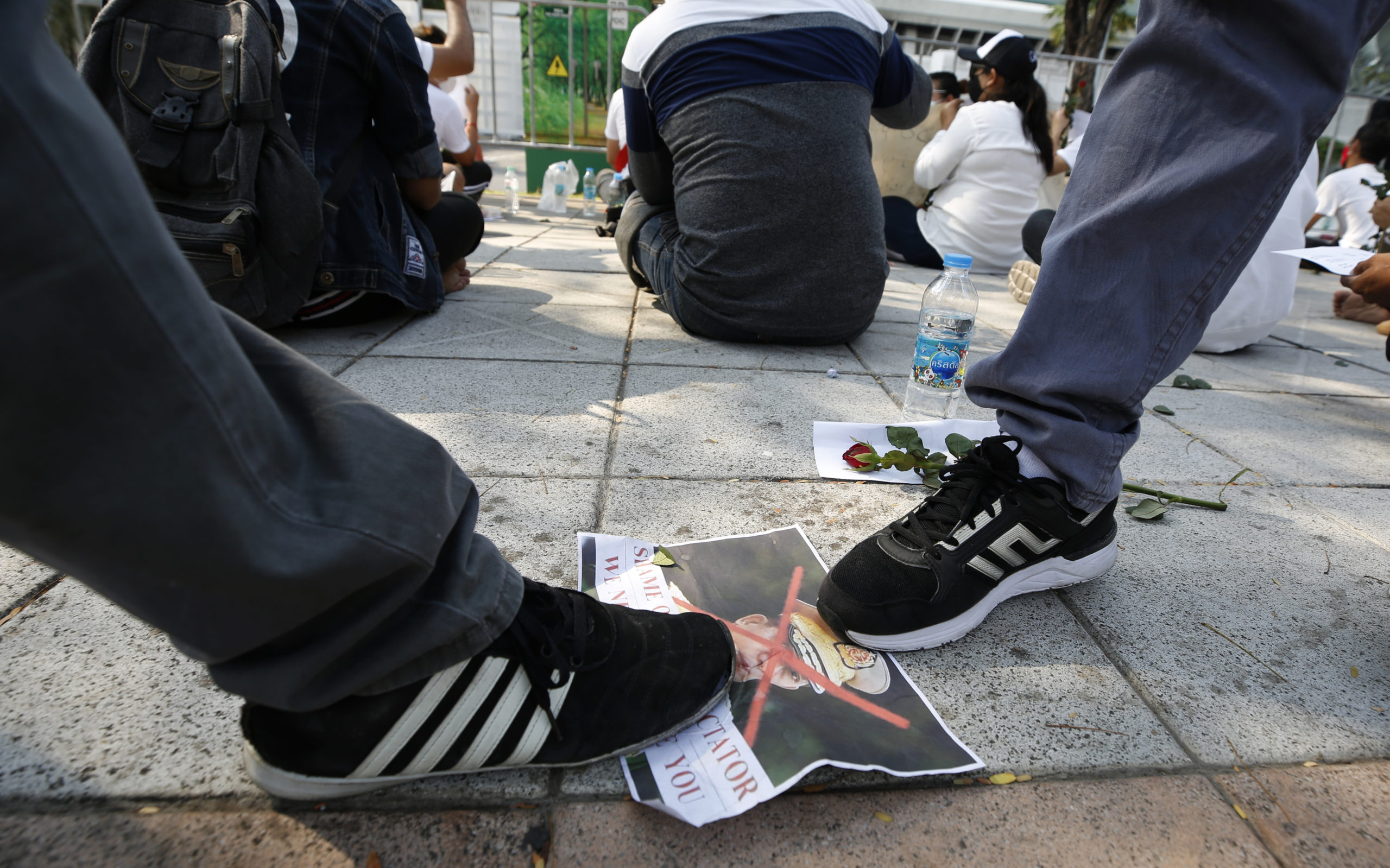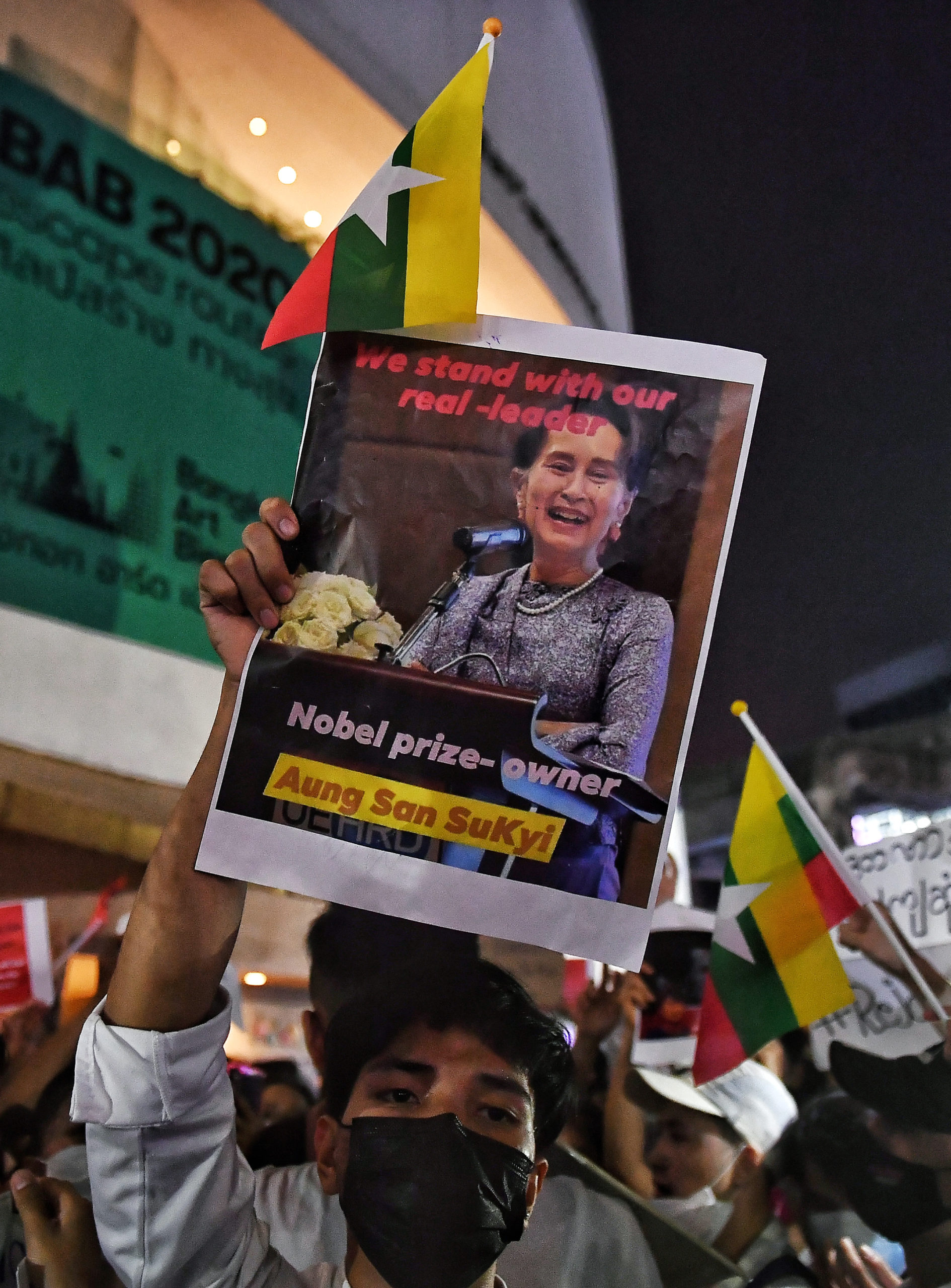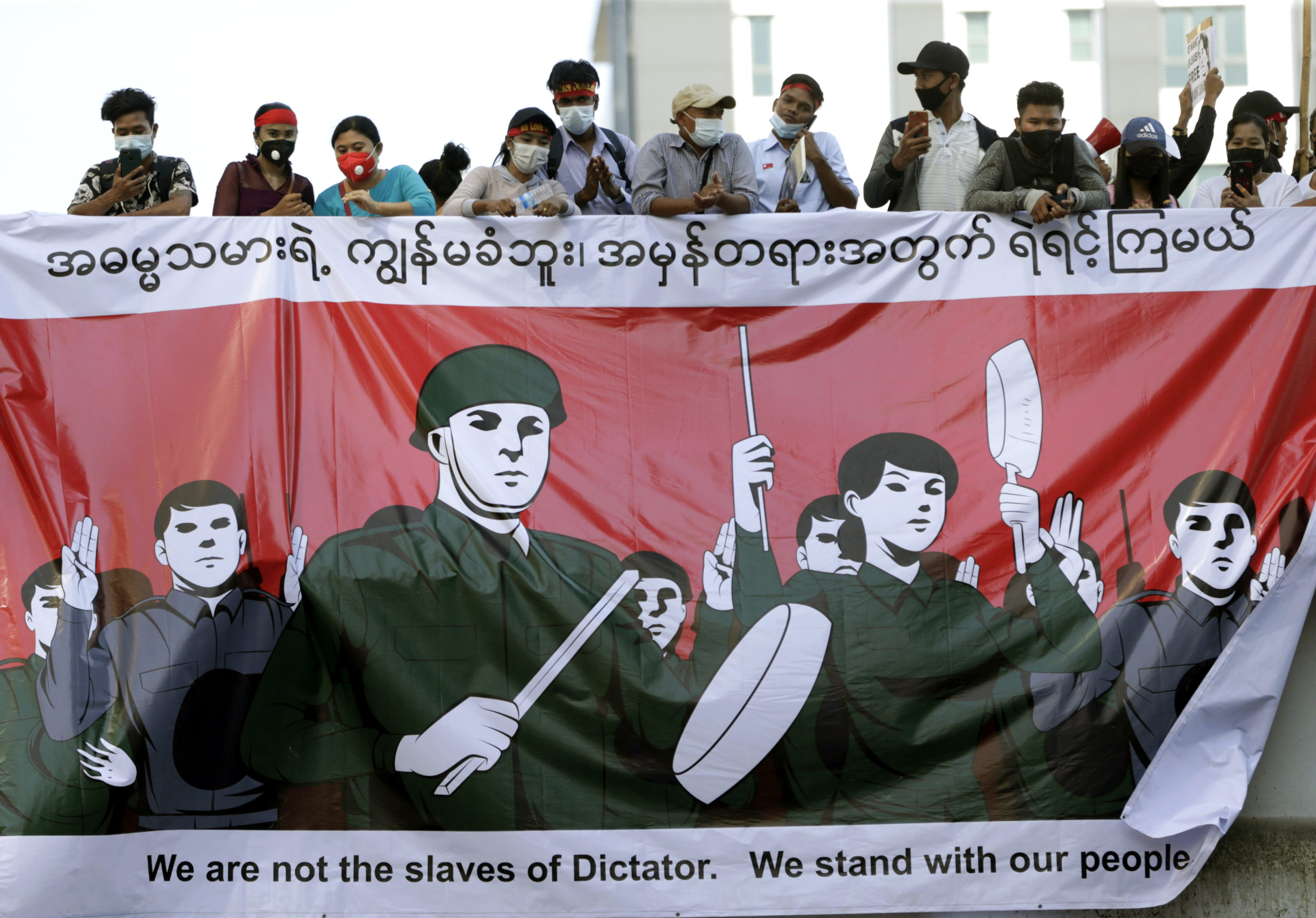Protesters gathered in the streets of Bangkok last week, stepping on photographs of their reviled military leader in a symbolic act of desecration to protest the overreaching power of the junta over their country’s political affairs.
This was not a scene of the Thai political protests that have come to dominate headlines throughout 2020, but rather of Burmese activists outside their nation’s embassy in the Thai capital, voicing their anger against the February 1 military coup.
As Myanmar is reeling from the effects of a military coup earlier this month, resistance and solidarity are diffusing across the border to Thailand as youth activists in the neighbouring countries increasingly articulate a shared struggle for democracy against military institutions and state control.
Across social media platforms, youth activists on both sides of the border and across Asia are connecting through mutual experiences and over shared symbols, with Myanmar now the latest inductee of the growing Milk Tea Alliance movement, joining Thailand, Hong Kong, and Taiwan.
“There’s a mix of fear, excitement, and anger,” said Aye Min Thant, a journalist based in Yangon. Past memories of government crackdown on protests, as in the 8888 uprising – Myanmar’s brutally suppressed student-led pro-democracy movement in 1988 – loom over the protesters.
Still, there is excitement among the largely young Myanmar protesters, not to mention anger both for the arrest of Suu Kyi and the dismissal of the election results, especially after the sacrifices made to vote during a pandemic.
The demands of the protests and acts of civil disobedience include calling for the release of political prisoners, re-writing the 2008 constitution and rejecting the military coup. Unifying the resistance in Myanmar is the three-finger salute, a symbol that has also become prominent in the youth-led democracy movement in Thailand.
“I used to see a lot of viral posts about why [Thai protesters] chose the three-finger salute from the Hunger Games [movies] and what the symbol means,” said Aung Kaung Myat, a Burmese political science graduate student studying in Hong Kong. Having been part of the 2019 Hong Kong protests, he witnessed from afar the Thai protests, and is now watching that same spark light in his native Myanmar. “As soon as the coup started in my country, it wasn’t hard for people to adopt the same symbol so that they can kind of raise awareness of what’s going on.”

Yangon-based journalist Aye Min Thant points out that although not every protester in Myanmar may have made the connection, the shared symbols, like the three-finger salute, have become ubiquitous.
“Not everyone is necessarily deeply interested in international politics that way, but it has been adopted by pretty much everyone [in Myanmar],” she told the Globe.
The three-finger salute was first seen in Thailand as the symbol for the protests calling for reform to the monarchy and against the military-affiliated government headed by Prayuth Chan-ocha – a military general, now civilian prime minister, who came into power through the 2014 coup.
But in a striking moment of mutual solidarity, the flows of influence ran the other way on February 10, with the act of banging pots and pans, a symbol of defiance popularised in Yangon and across Myanmar in recent days, replicated in Bangkok as the first Thai pro-democracy protest of the year resumed.
The military connections between Myanmar and Thailand have not gone unnoticed among observers. General Min Aung Hlaing maintains close relationships with top military leaders in Thailand and is widely known as the “adopted son” of Privy Council president, General Prem Tinsulanonda.
On Wednesday, in a moment laced with irony it was reported that coup leader General Min Aung Hliang sent out a letter to former Thai military leader, and current civilian prime minister, Prayuth Chan-ocha asking for help to support democracy, despite both having overthrown elected leaders.
More than simply pen pals between generals, the two countries’ governments have a shared history of heavy military intervention in their respective political arenas – with Myanmar undergoing a military-managed ‘democratic transition’ since 2011, and Thailand ruled by a military-affiliated government since a 2014 coup.
Charlie Thame, assistant professor in international relations at Thammasat University in Bangkok, said that the two country’s militaries are facing the same challenge of trying to maintain power in the face of a rapidly modernising society, in which traditional power structures are being challenged by an increasingly vocal youth.
“Both militaries are responding to similar challenges in terms of trying to modernise their political systems in line with their societies, while at the same time retaining predominant power and influence,” he said.
Thame continued that these parallels are not lost on protesters, with those in Myanmar holding an inherent empathy with the plight of Thai pro-democracy activists, even before the military coup earlier this month.
“The [2020] Thai protests were quite viral in Burmese social media, because the people in [Myanmar] don’t like the military,” said Aung Kaung Myat. “The military ruled for several decades and the military rule was quite brutal and quite abusive. So people are sympathetic towards Thai protesters.”

Formal relations between Naypyitaw and Bangkok are much less interesting, and potentially less consequential, than the popular trans-national solidarity expressed between Thai pro-democracy forces and their counterparts in Myanmar
In November last year, Myanmar held its general elections in which State Counsellor Aung San Suu Kyi’s National League for Democracy (NLD) party won by a landslide, winning over 80% of the seats against the military’s Union Solidarity and Development Party.
The military claimed widespread fraud in the election and, using this as rationale, staged a coup in the early hours of February 1, complete with the arrest of Myanmar’s elected leaders, most prominently Suu Kyi.
For Myanmar, Article 417 of the 2008 constitution has allowed space for the tatmadaw to reemerge, permitting a military takeover in the event of an emergency that it deems to threaten Myanmar’s sovereignty. In Thailand, the military overthrew the civilian government and imposed a junta in 2014 to “restore order” after political unrest. The military junta then drafted a new constitution in 2017 that installed a different electoral system allowing for 250 military-appointed senate members, providing them with a firm grip on Thai politics.
Both constitutions reduce the power of democratically elected politicians, and instead replace them with “supposedly ‘a-political’ skilled technocrats” explained Thame.
“The current constitutions of both countries were drafted either by or under close supervision of their respective militaries, with little to no input from non-elites,” Thame said.
Wielding similar claims over legitimacy to rule, and ASEAN’s prominent non-interference policy, the Thai government has turned away from commenting on the unfolding situation in Myanmar, labelling it the “internal affairs of the country”.
Instead, it is left to those on the streets to express solidarity between activists resisting intrusive military rule. The Free YOUTH Movement, a prominent organisation in the pro-democracy protests in Thailand, issued a statement of solidarity for the people of Myanmar the day the coup unfolded, “sharing the belief in democracy” and “struggle against dictatorship”.
“We’re seeing re-alignment of both polities [in Myanmar and Thailand], led by their younger generations who feel stifled and oppressed by their establishments,” Thame said. “Formal relations between Naypyitaw and Bangkok are therefore much less interesting, and potentially less consequential, than the popular trans-national solidarity expressed between Thai pro-democracy forces and their counterparts in Myanmar.”

But a grassroots struggle against authoritarian excesses across the region is being articulated as an alliance grows across East Asia – from Hong Kong to Taiwan, Thailand and now Myanmar – bonded over the shared drink of milk tea.
The Milk Tea Alliance – an online community that began in April last year as Thai, Taiwanese and Hong Kong activists banded against Chinese nationalists on Twitter – is centered through shared memes and art around the hashtag #MilkTeaAlliance. This past week it has also been referenced in protest art in Yangon, with drawings of Myanmar’s own milk tea laphet yay cho next to Hong Kong’s si mat lai cha.
Sophie Mak, a Milk Tea Alliance activist and human rights researcher in Hong Kong, says the use of humour in the advocacy of the Alliance is its key strength in pushing back against authoritarian regimes.
“These internet users use creative cartoons slogans and art to laugh off and counter their threats, making these governments’ aggressive bullying look weak and pathetic as a result,” Mak told the Globe. “This rising younger generation are fearless.”
The whole point of the Milk Tea Alliance is that there is shared solidarity. Even if one country, for example Myanmar experienced an internet shutdown, other Milk Tea Alliance members will still be able to speak out for them
So far, the Alliance has weathered the storm as Thailand’s military and monarchy fight back, both physically and legally, against the calls for change, and China crushes dissent in Hong Kong. Still, what remains is an online community bound through a shared fight aiming to create region-wide grassroots solidarity on rights abuses in the face of repression.
“The whole point of the Milk Tea Alliance is that there is shared solidarity. Even if one country, for example Myanmar experienced an internet shutdown, other Milk Tea Alliance members will still be able to speak out for them,” said Mak.
Bunkueanun Paothong, better known as Francis, is a prominent protester charged with ‘violence against the queen’ for his role in an October pro-democracy protest in Bangkok. The self-proclaimed Milk Tea Alliance political activist told the Globe that he sees it spreading across the region, with once disparate causes providing solidarity, resources and lessons through social media and across borders.
“We have seen a kind of similarity between Milk Tea Alliance countries, starting from Hong Kong to Thailand and Myanmar. With the slogans ‘we fight for democracy, we fight for freedom’, binding the movements together,” Francis said. “[Political activists] might not be as powerful as the military with a lot of guns, tanks, personnel. But we can keep our politicians and military officers in check by scrutinising them.”
This cross-border solidarity stands in contrast to Southeast Asia’s tradition of turning a blind eye to the domestic affairs of one another, providing yet another example of the region’s youth challenging the rules established by older generations and infused into Southeast Asia’s governing institutions.
“If we can cultivate anything out of the pro-democracy movement in ASEAN, it will come to a time where we can come back to redefine the community from a dictators club into something that is really built for Southeast Asian people,” said Francis.
How far this solidarity and inspiration can diffuse, perhaps spreading to youth movements in countries such as Cambodia, itself ruled under the increasingly tight grip of Prime Minister Hun Sen’s Cambodian People’s Party, is yet to be seen.
“There are many people who cherish democracy in each of these ASEAN countries, who want change, who wish for democratic change.”


